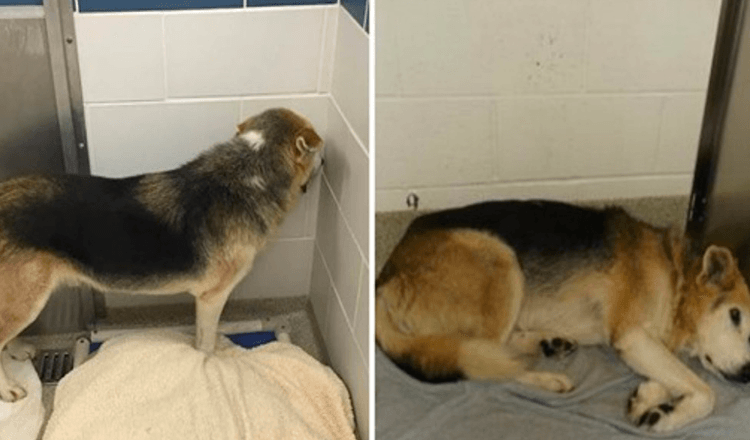
Jack, a senior dog, was so scared and depressed when he arrived at Gloucester-Mathews Humane Society in Virginia.

His sadness was so big as he’d place his face in his kennel’s corner.

Gloucester-Mathews Humane Society wrote that Jack places his face in the corner whenever they enter his kennel, so they are forced to pick him up. They also found out that he becomes a little bit more alive when he is outside.

So, Susie’s Senior Dogs decided to find a forever home for him after a month at the shelter. They shared a post on Facebook read that Jack has never seen any aggressive toward volunteers or staff despite his fear of the shelter.

They also added that they wanted to find a forever home for him as they are heartbroken to think that he may have lived for his entire life with his loneliness.

Thankfully, many inquiries were received by Susie’s Senior Dogs for Jack, who is heart worm positive and has bad hips and pre-renal kidney disease. Happily, a lovely young lady came directly to the shelter to meet Jack with her other canine companion.

The meeting was so great as the woman directly fall in love with Jack who was also friendly with her. So, she decided to adopt him to live with her other companion. How a happy ending!
Share this with your family and friends.
Originally appeared on: thepetneeds.com
---------
10 Common Dog Health Problems
Some health problems are specific to certain breeds, such as breathing complications for flat-faced dogs. But several other canine health issues can affect any dog. Here are 10 typical health conditions you need to watch out for in your four-legged best friend:
Top 10 Common Dog Health Problems
Skin Problems
One of the most obvious signs that your dog has a skin condition is itching. Other symptoms that may suggest that your dog has a skin problem include rashes, redness, dry skin, lumps, bumps, skin sores, dandruff, and hair loss.
Ear Diseases
Approximately 20 percent of dogs suffer from ear disease. It’s particularly common in breeds with floppy ears like cocker spaniels and basset hounds. It’s common to see wax buildup or discharge in their ear canal. But others may experience pain, itchiness, redness, swelling, and crusting in the ears.
Urinary Tract Infections
Simply known as UTI, this condition can make it uncomfortable for your beloved companion to pass urine. Signs of urinary tract infection include drinking water more than usual and passing urine more often than usual. Your dog may also only pass a small amount or lose bladder control. Additionally, you may see blood in their urine or notice a strong smell to it.
Vomiting
There are countless reasons why your pet may throw up. You don’t need to visit the vet each time your dog vomits. But it’s also not something you can just ignore. Don’t try to guess. If the vomiting persists or occurs with other symptoms like diarrhea or lethargy, you need to rush to the vet. It could be a sign of severe health problems, such as poisoning or gastrointestinal blockage.
Diarrhea
This symptom may occur on its own or be accompanied by vomiting. Its potential causes are similar to vomiting. One or two episodes of diarrhea may not be a pet emergency. But recurring diarrhea can result in dehydration.
Parasites
At some point in their lives, your pet may have to deal with discomfort due to internal or external parasites. Symptoms of parasites generally vary, depending on a few factors. These include the kind of parasite that has plagued your pet, where it lives, and how severe its infestation is.
Dental Issues
Like us, your dog can develop canine dental diseases due to high levels of plaque buildup. Several signs indicate that your pet may have dental disease. These include difficulty eating, bleeding of the gums or teeth, loose teeth, and bad breath.
Obesity
Nearly 30 percent of the general dog population is considered obese. Several factors contribute to a pet’s risk. These include age, genetic predisposition, lack of exercise, and overfeeding, among others.
Arthritis
This joint problem can restrict your dog’s mobility. Bring Fido to the vet if you see your dog slow down or limp before and after walks. Other signs include licking or chewing on tender areas and behavioral changes.
Poisoning
Symptoms of dog poisoning vary widely, depending on the kind of toxin a pet has been exposed to. The signs can range from vomiting to drooling, breathing difficulties, seizures, or worse, coma. Some of the most common poisonous substances are human foods like chocolates, grapes, raisins, onions, and caffeine. Other known culprits are human medications, household cleaning products, pesticides, and some plants.



GIPHY App Key not set. Please check settings